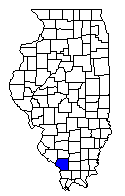
Gen. John A. Logan was born in Franklin County, Ill., in 1824. He entered
military service as Captain in the Mexican War and served for two years. At
the beginning of the Civil War he espoused the cause of the Union and
entered the volunteer service in 1861, when he raised and commanded the
Thirty-first Illinois Infantry. At the battle of Belmont, Mo., he led his
men into the fight with great gallantry. Though they were raw troops and had
never stood fire, yet they fought on this occasion, under the lead of
Colonel Logan, with a bravery seldom surpassed by veteran soldiers.
At the battle of Ft. Donelson, Colonel Logan's command held the right of the
line and was pressed by overwhelming odds. Stubbornly resisting the massed
columns of the enemy, he succeeded in holding his position until
reinforcements were brought and the Confederates finally driven from the
field. On that occasion he was severely wounded the first day of the battle,
but refused to go to the rear. For his meritorious conduct in that
engagement he was made a Brigadier-General and assigned to the army under
command of General Grant. At the battle of Shiloh he displayed his usual
courage and solid fighting qualities. For daring and distinguished conduct
al this terrible trial of strength between the great contending armies, he
was promoted to Major-General November 29, 1862.
Taking command of a division, General Logan accompanied Grant through the
Vicksburg campaign, and after the fall of that city, the Father of Waters
became, as in days past, the common property of the American people. Before
the war began. General Logan, in a speech to the people of Illinois,
declared that "If the rebel states, or any other foreign Government, ever
attempted to control the mouth of the Mississippi River the men of the
northwest would hew their way to the Gulf of Mexico, sword in hand." That
prophecy was fully realized. The people of the northwest nobly vindicated
the truth of what General Logan had said years before, and forever settled
the question that the men of the great northwest are unalterably resolved
that the Mississippi River is the common birthright of the children of its
far-spreading valleys, which they will neither voluntarily relinquish nor
peacefully surrender. It was indeed a proud day for General Logan when he
could stand on the ruins of the last hostile fortification along this noble
river and fully realize the thought that the yeomanry of the northwest had
literally carved their way through the entire Confederacy to vindicate their
claim to this, the greatest of all American rivers. The Stars and Stripes
could now be raised on a steamboat at St. Paul, Minn., and borne, proudly
waving, to the mouth of the national thoroughfare and out on the gulf below.
This work having been finished by the western army, the command sought other
fields of conquest.
From Vicksburg, General Logan started with Sherman, through Mississippi and
Alabama, to the relief of Chattanooga, in Tennessee. November 24, 1863, the
battle of Mission Ridge was fought and won. In that great conflict Logan
bore a conspicuous part and again acquitted himself with distinguished
honor. At the beginning of the Atlanta campaign he was placed in command of
the Fifteenth Atlanta Cavalry. In command of this corps he made the
celebrated march through the entire Confederacy, from Chattanooga to
Atlanta, thence to Savannah, through the Carolinas and Virginia to Richmond,
and on to Washington. On reaching the latter city General Howard was
appointed Superintendent of the Freedmen's Bureau, and General Logan
succeeded to the command of the Arm}- of the Tennessee, consisting of the
Fifteenth and Seventeenth Atlanta Cavalry. Thus from the position of a
humble station he had fought his way to the supreme command of a magnificent
army of a hundred thousand men.
In every department of life the native talents and energy of the General
brought him success. As a lawyer his was a brilliant career. As a
politician, he had, before the Rebellion, attained a wide and growing
popularity in Illinois, having been elected to Congress, and having held
other posts of honor. Illinois may be proud of her Logan, whose noble valor
has vindicated her honor in many a fiercely fought battle, and whose eminent
achievements in peaceful pursuits are surpassed only by his daring deeds in
the bloody theatre of war. He was a lover of military-science and born to be
a commander. Among tiled soldiers he was the idol of the Army of the
Tennessee. He was loved by his men not only because he was their commander,
but literally their leader on all occasions where danger was to be
encountered.
At the close of the Civil War, General Logan resigned his position and
retired to civic life, though from that time until his death, December 26,
1886, he was closely associated with the history of Illinois and the United
States as well. In person he was a remarkable man, resembling no other
general. His complexion was dark, his eyes and hair very black, and in
stature he was low and heavy. He wore his hair and mustache long, which
increased his resemblance to the Indian chiefs of the western wilds.
Extracted from Portrait and Biographical Record of Randolph, Jackson, Perry and Monroe Counties, Illinois, published in 1894, page 203.
Randolph |
Perry | Franklin |
Perry MO |
 |
Williamson |
| Union |


